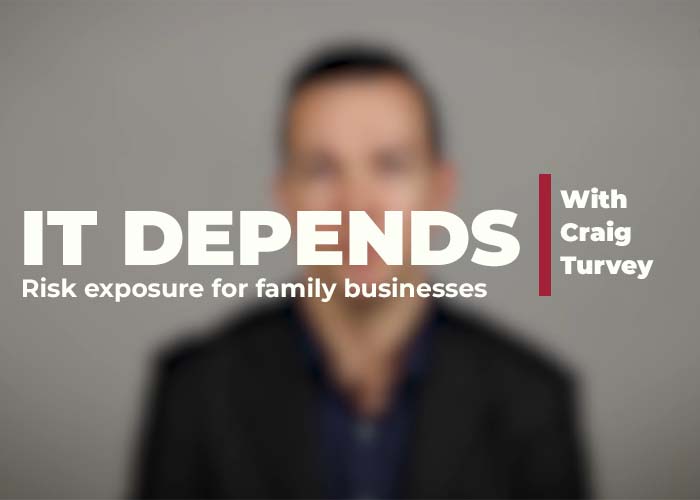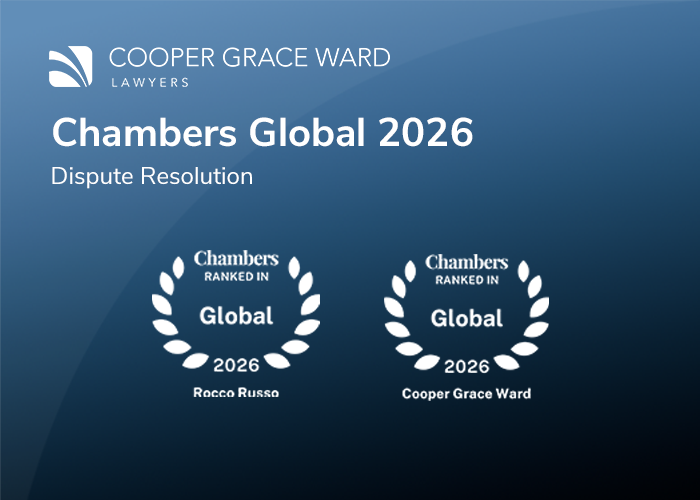Video Transcript
In this edition of It Depends, I’d like to talk about family businesses and whether they have any risk exposure in a family law property settlement, or whether there’s any strategies you can do to try and prevent family law property settlement affecting a business. I’ll be talking about this in a little bit of detail today, but Justine Woods and I will be expanding on the topic in much more detail at the Adviser Conference on the 27th and 28th of March this year.
Why could a family business be at risk?
In a family law property settlement, the very first step is for the court to identify the property, superannuation, liabilities and financial resources of the parties. In plain English, that pretty much means any assets that people have an interest in, is considered, which can include interest in trusts, in businesses and in any companies. Therefore, if either or both of the spouses have an interest in a business, for example, that interest will be considered in the property settlement, it will be allocated a value and this could have a significant impact on the business in terms of its ongoing operations.
What is the risk exposure?
The risk exposure from the family businesses perspective is that it may be joined as a party to any court proceedings. There may be injunctions made against the business, which means it may be prevented from doing certain things as part of its ongoing operations. It may also be that there are specific injunctions made against the spouse who has an interest in the business, which could have an impact depending on what level of accountability or management responsibility they have.
It may be that as part of a property settlement, given that values have to be attributed to parties, interests and business, it may therefore be that a forensic accountant comes in at some stage and has to value the business for the purpose of the property settlement. Now, this may mean that all sorts of financial details and records and things that the people involved in the business don’t really want to be disclosed and given to third parties have to be, as part of that process.
Can we minimise risk?
It depends.
Depending how the business is structured, if it’s in such a way that the spouse has a very clear interest in the business, that they have some level of control or power over the general day to day running and management of the business. It may be unavoidable, and we often have clients who will come to us once that separate and say, “look, this, this is how it’s structured, what can we do?” And sometimes the advice for people at that point is it’s just too late. Once you’ve separated, there’s not much you can do to untangle things or to remove someone’s interest such that a court won’t interfere with that. However, if it’s done as part of the family planning strategy, something we speak to clients about and other members of the family is where is the greatest risk likely to be? Is it with particular people who have spouses? Frankly, people in relationships that aren’t going particularly well? Where is the element of risk in the family? Where is the weak point? So, it’s often about, can we move people’s interest or transfer people’s interests or move the risk from one person to another? Given that we think the risk profile for a particular couple is much safer than for, a newlywed couple who the relationships are on the rocks at a really early stage.
So that can be an important sort of, hard, but important discussion to have with family members. Another is what’s called a financial agreement. Most people have heard of a prenuptial agreement, which is really just a colloquial term for a financial agreement, which is a private agreement between two people at any stage in the relationship about any of their assets. So, people often come to us and say, “well, look, we don’t want an agreement that addresses everything that happens if we separate, but we’ve got this family business structure, and I really don’t want my family law separation to affect all of that.” So, it’s possible to have, in a financial agreement, a strict quarantine of the business and the business structure so that the business is protected from a family law property settlement claim, but nothing else. And that can often be, a way of getting around what is otherwise a bit of an unromantic document that some couples may not want to enter into.
If you have any questions about your family business structure and whether there’s any family law risk exposure, please don’t hesitate to contact me or one of the other family lawyers at Cooper Grace Ward. Otherwise, we look forward to seeing you at the upcoming Adviser Conference.





